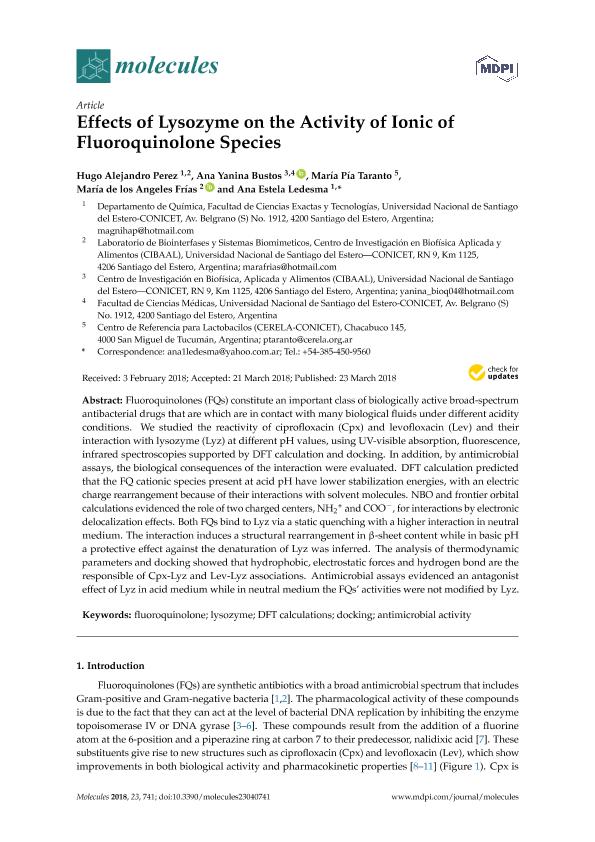Artículo
Effects of lysozyme on the activity of ionic of fluoroquinolone species
Pérez, Hugo Alejandro ; Bustos, Ana Yanina
; Bustos, Ana Yanina ; Taranto, Maria Pia
; Taranto, Maria Pia ; Frías, María de los Ángeles
; Frías, María de los Ángeles ; Ledesma, Ana Estela
; Ledesma, Ana Estela
 ; Bustos, Ana Yanina
; Bustos, Ana Yanina ; Taranto, Maria Pia
; Taranto, Maria Pia ; Frías, María de los Ángeles
; Frías, María de los Ángeles ; Ledesma, Ana Estela
; Ledesma, Ana Estela
Fecha de publicación:
03/2018
Editorial:
Molecular Diversity Preservation International
Revista:
Molecules
ISSN:
1420-3049
Idioma:
Inglés
Tipo de recurso:
Artículo publicado
Clasificación temática:
Resumen
Fluoroquinolones (FQs) constitute an important class of biologically active broad-spectrum antibacterial drugs that are which are in contact with many biological fluids under different acidity conditions. We studied the reactivity of ciprofloxacin (Cpx) and levofloxacin (Lev) and their interaction with lysozyme (Lyz) at different pH values, using UV-visible absorption, fluorescence, infrared spectroscopies supported by DFT calculation and docking. In addition, by antimicrobial assays, the biological consequences of the interaction were evaluated. DFT calculation predicted that the FQ cationic species present at acid pH have lower stabilization energies, with an electric charge rearrangement because of their interactions with solvent molecules. NBO and frontier orbital calculations evidenced the role of two charged centers, NH 2 + and COO − , for interactions by electronic delocalization effects. Both FQs bind to Lyz via a static quenching with a higher interaction in neutral medium. The interaction induces a structural rearrangement in β-sheet content while in basic pH a protective effect against the denaturation of Lyz was inferred. The analysis of thermodynamic parameters and docking showed that hydrophobic, electrostatic forces and hydrogen bond are the responsible of Cpx-Lyz and Lev-Lyz associations. Antimicrobial assays evidenced an antagonist effect of Lyz in acid medium while in neutral medium the FQs’ activities were not modified by Lyz.
Palabras clave:
Antimicrobial Activity
,
Dft Calculations
,
Docking
,
Fluoroquinolone
,
Lysozyme
Archivos asociados
Licencia
Identificadores
Colecciones
Articulos(CERELA)
Articulos de CENTRO DE REFERENCIA PARA LACTOBACILOS (I)
Articulos de CENTRO DE REFERENCIA PARA LACTOBACILOS (I)
Articulos(SEDE CENTRAL)
Articulos de SEDE CENTRAL
Articulos de SEDE CENTRAL
Citación
Pérez, Hugo Alejandro; Bustos, Ana Yanina; Taranto, Maria Pia; Frías, María de los Ángeles; Ledesma, Ana Estela; Effects of lysozyme on the activity of ionic of fluoroquinolone species; Molecular Diversity Preservation International; Molecules; 23; 4; 3-2018; 741-761
Compartir
Altmétricas



